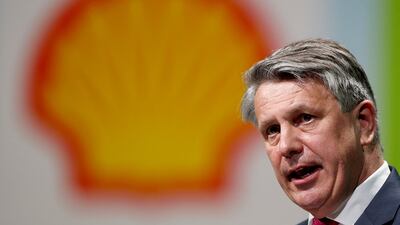Shell boss Ben van Beurden has applauded European efforts to support consumers hit by a surge in gas prices but warned governments not to meddle in the market with price caps.
European governments keen to intervene to limit gas prices should focus on protecting weaker parts of society from high energy prices, the Shell chief executive said.
“Can we make a meaningful intervention in gas markets here in Europe? That is a much more challenging prospect,” he said.
“The solution should not be government intervention but protection of those who need protection.”
Mr Van Beurden also told the Energy Intelligence Forum in London that he “struggled” to see how a price cap on Russian oil would work.
Meanwhile, the British government is looking at long-term energy contracts with other countries to secure supply, UK prime minister Liz Truss has said.
Asked if she is contemplating buying many years' worth of Norwegian gas at close to current prices, Ms Truss told reporters in Birmingham that the talk was premature. “What I have said is, first of all, we will move forward on our own energy security," she said.
“So that’s more renewables here in the UK, it’s more nuclear power here in the UK, and it’s also moving forward faster with using North Sea facilities.
“But we are looking at long-term energy contracts with other countries because as well as making sure we’ve got a good price, energy security is vitally important."
European commissioner Paolo Gentiloni said on Tuesday that a whole of Europe approach would be the best outcome for address the gas market crunch.
“We are not blaming countries, we are not discussing the fact that single countries and member states, inevitably, are supporting their economies,” he said.
“But if we want to avoid fragmentation, if we want to face this crisis, I think we need a higher level of solidarity and we need to put in place … common tools.”
Germany has drawn criticism from some EU capitals and institutions in the past days for unilaterally announcing a €200 billion ($198bn) support package for its companies and households struggling with a surge in energy prices.
“And we never want to be in a position again where we’re dependent on authoritarian regimes for our energy. That’s why we’re in the situation we are now,” Mr Gentiloni said


